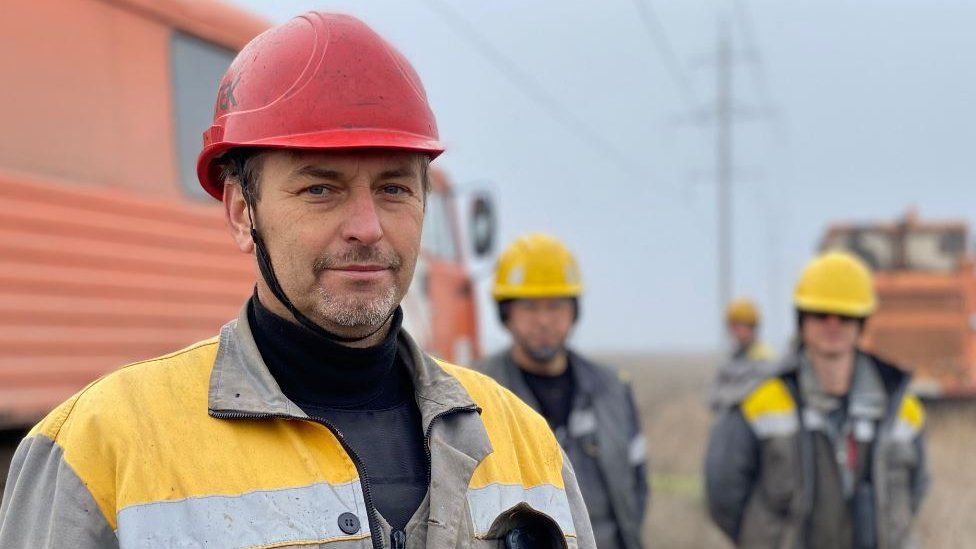
There is a business-like synchronisation to Andrii's Kysenko's team as they work on a downed electricity cable in the rural Kherson region.
With a crater only a few metres from the pylon, they're confident a shell was the culprit.
Two months ago, this 100km (62-mile) long powerline cut through the boundary of Russia's occupation.
Since Russian forces retreated about two weeks ago, a typically once in a five-year repair job has become a daily ritual for these engineers.
"Before, work like this was only necessary after extreme weather," explains Mr Kysenko. "Now it's like we're rebuilding the whole cable network from scratch."
They work for Ukraine's biggest energy company DTEK and have so far repaired 50km of this line.
They expect the second half to be more difficult as they near the Dnipro River, where there is increased shelling.
As far as work environments go, they don't get much more challenging - not least with the flak jackets they all must wear.
Yet his team methodically clamp the cable back together and hoist it into place.
As the powerline stretches into the misty horizon, it seems like an endless treadmill of work.
"When it all began, the first days were challenging," the engineer says. "There would be constant shelling and torn cables.
"But we got used to it, and we have to hope things will get better."
As the Kherson region continues to be liberated, the demand on Ukraine's strained energy grid rises too.
It's why the authorities are urging people to leave the region, but for many, that is easier said than done.
The villages close to the pylons have spent eight months without water or power.
The roads are dotted with shell craters. Distant artillery reminds you the fighting has only moved, not disappeared.
We meet 90-year-old Anton Kramar, whose windows are boarded up after they were smashed by shrapnel, which injured his wife.
They've lived here for 50 years and have seen three wars.
"It's very hard," he says. "People bring candles, but they don't last long."
Some humanitarian aid has reached their village. Mr Kramar says he was promised wood and an oven, but they haven't arrived.
"If we get no oven, then we'll have to go cut the trees ourselves and carry the wood on our shoulders.
"I've worked my entire life but have nothing."
In his flat, Bohdan Dzepchuk shows us his small gas stove which is his only source of heat. He still uses it to cook meals for his neighbours who don't have one.
"Maybe I should go to Kyiv and ask for help there!" he suggests.
"This is madness."
He only uses half of his flat because the windows are smashed in the other rooms. The cold air is biting as you peer into his living room.
Then for Mr Dzepchuk, it becomes too much.
"This is no way to live. It's madness." He says tearfully. "I don't know what to do.
"I've never cried like this in my life. Now I'm an old man."
Kyiv has accused Russia of "crimes against humanity" after their latest missile strikes.
Moscow's new tactic of targeting infrastructure has left Ukraine a darker country.
That's not to say Ukrainians' sense of resolve has been weakened necessarily, but more are suffering.
Moscow's claims of only targeting military sites are falling on deaf ears in this part of Kherson.
Additional reporting by Daria Sipigina, Alex Milner and Moose Campbell
-
- 3 days ago
-
- 5 days ago
-
- 4 days ago
Related Topics
from Via PakapNews